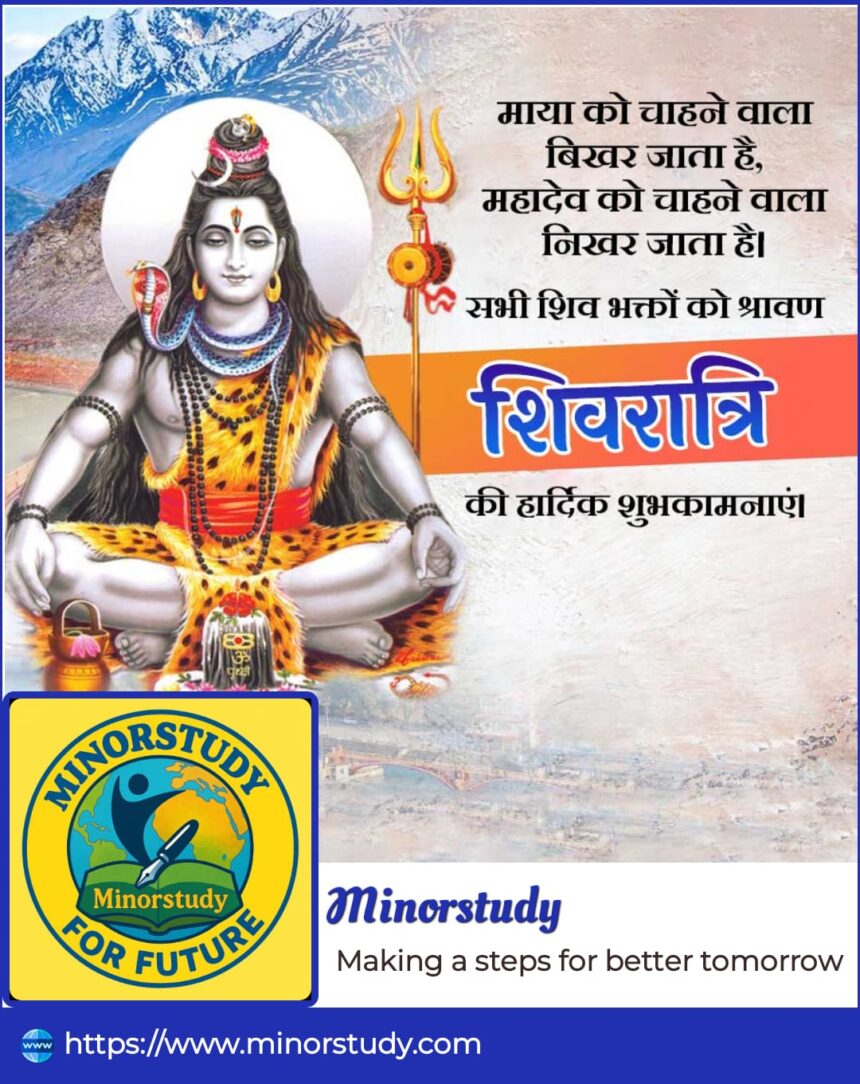Powerful Reasons Why Maha Shivratri Transforms Lives Every Year
🕉️ Introduction: The Night of the Supreme Divine
Maha Shivratri, or “The Great Night of Shiva,” is one of the most sacred nights in Hinduism, observed with deep spiritual fervor and devotion across India and by Hindus worldwide. It is a time to remember and worship Lord Shiva, the supreme being who symbolizes destruction, transformation, and regeneration.
- 🕉️ Introduction: The Night of the Supreme Divine
- 📜 History of Shivratri
- 🗓️ Timeline of Shivratri
- 📊 Interesting Facts About Maha Shivratri
- 🔱 Religious and Spiritual Significance
- 🎉 Observance and Rituals
- 💬 Frequently Asked Questions (FAQs)
- Q1: Why is Shivratri celebrated at night?
- Q2: What is the difference between Shivratri and Maha Shivratri?
- Q3: Can non-Hindus observe Maha Shivratri?
- Q4: Is it mandatory to fast on Shivratri?
- Q5: What are the benefits of chanting “Om Namah Shivaya”?
- 🌍 Importance in Our Daily Lives
- 🎈 Wishing and Greetings
- 🌟 Significance in Society
- 🧠 Important Points to Remember
- 🧘♀️ Conclusion: From Night to Enlightenment
Unlike other Hindu festivals which are celebrated during the day, Shivratri is celebrated at night, signifying the journey from darkness to light, ignorance to wisdom, and ego to enlightenment.
📜 History of Shivratri
🕰️ Ancient Origins
The term “Shivratri” translates to “Shiva’s Night” and is mentioned in several ancient scriptures, including the Shiva Purana, Skanda Purana, and Linga Purana.
According to mythology, Maha Shivratri marks the convergence of Shiva and Shakti, representing the union of masculine and feminine energies that balance the universe.
Another popular belief states that it was on this night that Lord Shiva consumed the Halahala poison that emerged during the Samudra Manthan (Churning of the Ocean) to save the universe, and thus, devotees offer milk and water to cool his throat.
🗓️ Timeline of Shivratri
| Timeline | Event |
|---|---|
| Vedic Era | Shiva worship mentioned in Rig Veda and Atharva Veda. |
| Ancient Period | Festivals like Shivratri started to gain ritualistic importance. |
| Puranic Period (~500 CE) | Documented in scriptures like Shiva Purana, Lingam worship popularized. |
| Medieval India | Temples built dedicated to Lord Shiva; regional Shivratri fairs started. |
| Modern Day | Observed globally, especially among Shaivites and spiritual seekers. |
📊 Interesting Facts About Maha Shivratri
Occurs annually on the 14th night of the dark fortnight (Krishna Paksha) of the month of Phalguna (February/March).
Unlike most festivals, it emphasizes fasting, night vigil, and meditation.
Shiva Lingam Abhishekam (ritual bathing) is the main form of worship.
Bael leaves, milk, honey, and ghee are considered sacred offerings to Shiva.
In many traditions, Maha Shivratri is believed to be the wedding night of Lord Shiva and Goddess Parvati.
It is considered highly auspicious for meditators, yogis, and spiritual aspirants.
In some temples, a 12-hour or 24-hour Rudrabhishek is performed by priests and devotees.
🔱 Religious and Spiritual Significance
🔍 What Makes Shivratri So Important?
Symbol of Inner Awakening: The stillness and meditation practiced on Shivratri night are symbolic of stilling the mind and awakening to higher consciousness.
Spiritual Cleansing: Devotees believe that sincere prayers and fasting on this night absolve them of past karmas and sins.
Union of Energies: The divine union of Shiva and Shakti signifies inner balance of the masculine and feminine principles within oneself.
Gateway to Moksha (Liberation): Scriptures state that one who stays awake and chants “Om Namah Shivaya” on Shivratri attains Moksha.
🎉 Observance and Rituals
🛕 How is Shivratri Celebrated?
Early Morning Rituals: Bathing, wearing clean clothes, and visiting Shiva temples.
Fasting (Vrat): Observed by millions, either with fruits or complete Nirjala fast (no food or water).
Abhishekam: Performing Rudrabhishekam with milk, ghee, curd, sugar, honey, bael leaves, sandalwood, and water.
Jaagaran (Night Vigil): Devotees remain awake all night, chanting Shiva mantras and singing bhajans.
Meditation and Yoga: Practicing silence, breath control, and Dhyana (meditation) to connect with the divine.
💬 Frequently Asked Questions (FAQs)
Q1: Why is Shivratri celebrated at night?
Because Lord Shiva is believed to have performed the cosmic dance of creation and destruction (Tandava) on this night.
Q2: What is the difference between Shivratri and Maha Shivratri?
There are 12 Shivratris in a year, one every lunar month, but the one in Phalguna is the most significant and is known as Maha Shivratri.
Q3: Can non-Hindus observe Maha Shivratri?
Yes. Maha Shivratri is a universal spiritual night, and people from any faith interested in meditation, yoga, or Shiva philosophy may observe it respectfully.
Q4: Is it mandatory to fast on Shivratri?
Fasting is optional but highly encouraged, as it helps in mental clarity and spiritual connection.
Q5: What are the benefits of chanting “Om Namah Shivaya”?
It calms the mind, reduces stress, promotes spiritual energy, and helps open the inner consciousness.
🌍 Importance in Our Daily Lives
Even though it is a religious observance, Maha Shivratri offers valuable lessons for daily life:
Teaches Self-Discipline: Through fasting and silence, we practice control over senses and thoughts.
Promotes Inner Peace: Meditation and chanting reduce anxiety and improve mindfulness.
Cleansing and Detox: The physical fasting aligns with detoxifying the body and mind.
Connects with Nature: Shiva represents the cosmic forces, and this night allows us to harmonize with nature and universal rhythms.
🎈 Wishing and Greetings
Here are some heartful Maha Shivratri wishes you can share:
“May Lord Shiva guide you on the path of truth and light. Happy Maha Shivratri!”
“Har Har Mahadev! May Shiva bless you with strength, peace, and infinite love.”
“On this divine night, may your soul awaken to the highest purpose. Happy Shivratri!”
🌟 Significance in Society
Unity in Diversity: Maha Shivratri is celebrated across India—North, South, East, and West—with regional variations, yet unified purpose.
Spiritual Revolution: Modern yogis and gurus use Shivratri as a tool for mass meditations and energy alignment.
Cultural Enrichment: Temple festivals, dance, music, and folk traditions related to Shiva enrich India’s cultural fabric.
Environmental Connection: Shiva is closely linked to Mount Kailash, rivers, forests—reminding us of the need to protect nature.
🧠 Important Points to Remember
✅ Shivratri is not just a festival, but a sacred time of deep introspection
✅ It aligns body, mind, and spirit with cosmic energies
✅ Emphasizes self-restraint, inner silence, and higher consciousness
✅ Encourages sustainable, simple living and reverence for nature
✅ Promotes unity, harmony, and universal spiritual awakening
🧘♀️ Conclusion: From Night to Enlightenment
Maha Shivratri is not merely a ritual—it is a portal to transcendence. It calls upon us to shed ego, detach from distractions, and dive inward. In an era dominated by stress and chaos, Shivratri serves as a timeless reminder of the power of stillness, surrender, and spirituality.
Whether you observe it through fasting, chanting, or simply with quiet reflection, this divine night offers a transformative experience—a shift from ordinary to extraordinary, from illusion to truth, from time to timelessness.
🕯️ May Lord Shiva bless you with inner peace, clarity, strength, and liberation. Har Har Mahadev!









You are my intake, I possess few blogs and very sporadically run out from brand :). “No opera plot can be sensible, for people do not sing when they are feeling sensible.” by W. H. Auden.
I¦ll right away seize your rss as I can’t to find your e-mail subscription hyperlink or e-newsletter service. Do you’ve any? Please permit me recognise in order that I may subscribe. Thanks.
Dead composed content, regards for selective information. “Life is God’s novel. Let him write it.” by Isaac Bashevis Singer.
I went over this web site and I conceive you have a lot of good information, saved to my bookmarks (:.